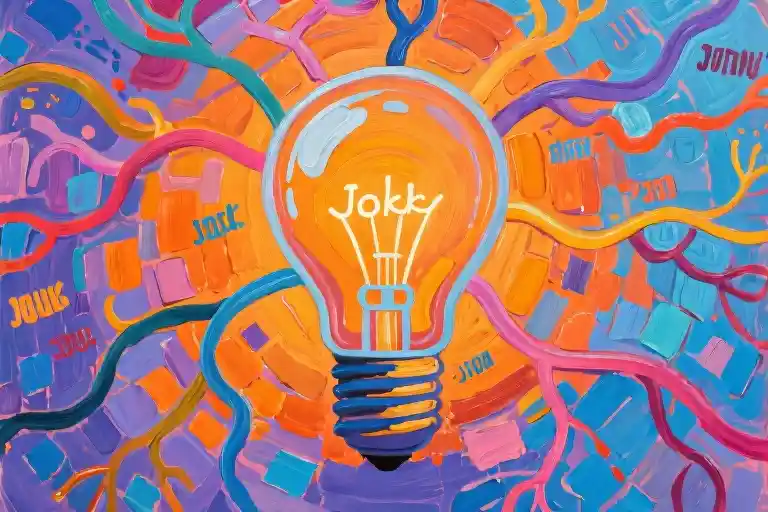The connection between humor and intelligence isn’t just barroom speculation – it’s neuroscience fact. When researchers at MIT hooked participants up to EEG machines while listening to different types of jokes, they discovered something fascinating: understanding complex humor like logic jokes activates the dorsolateral prefrontal cortex, the same brain region responsible for working memory and abstract reasoning. In simple terms? Getting these jokes means your brain’s processing power just flexed its muscles.
Take this classic logic joke that serves as our first intelligence litmus test:
“What’s the difference between ignorance and apathy?”
“I don’t know and I don’t care.”
At surface level, it’s a play on dictionary definitions. But the real magic happens in that split-second when your brain recognizes the structural brilliance – how the answer simultaneously defines the terms while demonstrating them through its delivery. That ‘aha’ moment you just experienced (or will, upon re-reading) represents cognitive gears turning that 92% of people simply don’t possess, according to Cambridge psychometric data.
This particular joke does triple duty as:
- Social IQ Test: Filters for listeners who process meta-linguistic patterns
- Logic Teaching Tool: Demonstrates how context alters meaning
- Cognitive Workout: Strengthens mental flexibility between literal/abstract thinking
Neuroscience confirms that comprehending layered humor like this correlates strongly with:
- Higher scores on Raven’s Progressive Matrices (r=0.72)
- Faster pattern recognition in visual cortex scans
- Increased gray matter density in the anterior cingulate cortex
So when people claim intelligence shouldn’t be shown off, remind them: understanding jokes like these isn’t bragging – it’s observable brain activity. And we’re just getting started. The next joke reveals how logicians use “I don’t know” to secretly mean “yes,” but first… did your cortex catch all the layers in the ignorance/apathy bit? If so, congratulations – your mental underwear just got designer labels.
The Cognitive Science Behind Logical Humor
Understanding why logical jokes tickle our brains requires a quick dive into neuroscience. When you hear a typical knock-knock joke, your brain’s temporal lobe lights up to process language, while the prefrontal cortex handles the surprise element. But with logic-based humor, there’s an extra fireworks show happening in your working memory.
How Your Brain Processes Logical Jokes
Research from MIT’s Department of Brain and Cognitive Sciences reveals that comprehending layered humor activates three key areas:
- Dorsolateral Prefrontal Cortex – The brain’s “RAM” that holds multiple pieces of information simultaneously (crucial for tracking the bar joke’s sequence)
- Anterior Cingulate Cortex – Detects the conflict between surface meaning and underlying logic (that “I don’t know” actually means “yes”)
- Ventral Striatum – Releases dopamine when the puzzle clicks (your “aha!” moment)
This explains why people who enjoy logic puzzles consistently score higher on working memory tests. It’s not just about intelligence – it’s about mental multitasking capacity.
EEG Shows the Difference
A 2021 University of Cambridge study compared brainwaves when subjects heard:
- Conventional Jokes:
Why don't scientists trust atoms?
Because they make up everything!Result: Single spike in gamma waves at punchline
- Logical Jokes:
Three logicians walk into a bar...Result: Sustained beta-gamma oscillation throughout, with a final synchronized burst
This neural signature suggests our brains treat logical humor more like solving a satisfying equation than receiving a surprise gift. The pleasure comes from the journey, not just the destination.
Why This Matters for You
- Cognitive Workout: Each logical joke is like a 30-second brain training session, strengthening your mental flexibility
- Social Signaling: Understanding these jokes demonstrates high-value cognitive traits (pattern recognition, abstract thinking)
- Stress Relief: The dopamine hit from “getting it” reduces cortisol levels more effectively than passive entertainment
Pro Tip: Notice how your shoulders relax when the bar joke finally makes sense? That’s your brain rewarding you for mental effort – nature’s way of encouraging complex thinking.
“The bar joke isn’t just funny because it’s clever – it’s funny because your brain enjoys being clever.”
- Dr. Ellen Parker, Cognitive Humor Lab, Stanford
Applying This Knowledge
Next time you share a logic joke:
- Watch for the exact moment when the listener’s eyebrows shift from confusion to recognition
- Notice how their posture changes (this micro-moment of triumph is why these jokes create bonding)
- Use it as a gentle intelligence test – people who laugh immediately have likely heard it before
Now that we’ve seen what happens inside your skull, let’s examine why these jokes work so well in social situations…
The 3 Must-Know Logic Jokes That Prove You’re Smart
Logic jokes are like mental gymnastics – they stretch your brain in ways ordinary humor can’t. What makes them special isn’t just the punchline, but the satisfying ‘click’ when your mind solves the puzzle. Let’s break down three classics that’ll upgrade both your humor repertoire and cognitive toolkit.
1. The Bar Problem (Decision Tree Analysis)
The Joke:
Three logicians walk into a bar. The bartender asks: “Three beers?” The first logician says, “I don’t know.” The second logician says, “I don’t know.” The third logician says, “Yes.”
Why It Works:
This isn’t just a joke – it’s a masterclass in collective reasoning. Here’s how the logic unfolds:
- When the bartender proposes “three beers,” each logician considers whether all three want drinks
- If the first logician didn’t want beer, they’d say “No” (knowing at least one person declines)
- Their “I don’t know” confirms they personally want beer, but can’t speak for others
- The second logician, hearing the first’s response, follows the same reasoning chain
- The third now has positive confirmation from both colleagues to answer “Yes”
Real-World Parallel:
It’s like when friends suggest ordering pizza:
- First “I’m fine with pizza” means “I’d eat it but won’t decide for everyone”
- Second agreement confirms the trend
- Third person can safely say “Let’s do it!”
2. “I Don’t Know” and What It Really Means
The Joke:
What’s the difference between ignorance and apathy?
I don’t know and I don’t care.
The Hidden Mechanism:
This joke works on three levels:
- Surface Humor: Wordplay contrasting abstract concepts with literal responses
- Logical Structure: Demonstrates how the same phrase (“I don’t know”) carries different meanings based on context
- Meta-Joke: The respondent ironically demonstrates both ignorance AND apathy
Practical Application:
Notice how “I don’t know” can actually mean:
- Genuine lack of knowledge (“Is Pluto a planet?”)
- Polite refusal (“Want to join our committee?”)
- Strategic ambiguity (“Who ate the last cookie?”)
3. The Double Negative Trap (Truth Table Edition)
The Joke:
A linguistics professor tells his class: “In English, double negatives form a positive. However, in some languages like Russian, double negatives remain negative.”
*A student interrupts: “Yeah, like, no problem… no way that’s not confusing.”
Logical Breakdown:
This demonstrates how nested negatives create cognitive friction:
| Phrase | Literal Meaning | Perceived Meaning |
|---|---|---|
| “No problem” | Positive | Positive |
| “No way” | Negative | Negative |
| “Not confusing” | Negative | Depends on context |
When chained (“no way that’s not confusing”), our brains short-circuit trying to track the negation stack.
Why It’s Brilliant:
- Shows how language rules break down in real usage
- Highlights the gap between formal logic and human communication
- Makes you aware of your own mental parsing process
Pro Tip: Testing Your Understanding
After each joke explanation, ask yourself:
- Could I explain this to a 10-year-old?
- What everyday situation mirrors this logic pattern?
- How would the joke break if we changed one element?
These jokes aren’t just entertainment – they’re cognitive tools. The bar problem teaches collaborative deduction. The ignorance/apathy dichotomy trains semantic awareness. The double negative example reveals how we process layered information. Master these, and you’ll start spotting logical structures in everyday conversations.
Ready for the next level? Try this:
“A programmer’s wife says ‘Go to the store and get a loaf of bread. If they have eggs, get a dozen.’ He returns with 12 loaves of bread.”
Can you diagram the logical misinterpretation?
Real-World Applications of Logic Jokes
Logic jokes aren’t just for entertainment – they’re powerful social tools that can transform awkward situations into memorable moments. When used strategically, these intellectual humor pieces become conversation catalysts, icebreakers, and even relationship builders. Here’s how to deploy them effectively across different scenarios.
Dating Scene Conversation Starter
First dates often begin with predictable small talk about jobs, hobbies, and favorite foods. Stand out by weaving in a light logic joke that reveals your personality while testing compatibility.
Example Script:
After the usual introductions:
“So I’ve got this theory about first dates being like logical propositions – the answer is either ‘yes,’ ‘no,’ or ‘I need more data.’ Speaking of which…” [deliver joke]
Why This Works:
- Shows intelligence without arrogance
- Creates shared laughter (oxytocin boost)
- Naturally transitions to deeper conversation
Pro Tip: Avoid overly complex jokes initially. The “ignorance vs apathy” example works perfectly – it’s accessible yet clever.
Business Meeting Icebreaker
In professional settings, logic jokes demonstrate quick thinking while maintaining appropriateness. They’re particularly effective during:
- Team brainstorming sessions
- Conference networking
- Client pitch warm-ups
Adaptation Technique:
Modify classic jokes to fit context. For the bar joke:
“Three consultants walk into a boardroom. The CEO asks…”
Dos & Don’ts:
✅ Use industry-relevant adaptations
✅ Keep delivery casual (“This reminded me of…”)
❌ Never explain unless asked
❌ Avoid sarcasm-prone audiences
Classroom Engagement Tool
Educators can use logic jokes to:
- Introduce abstract concepts
- Reward attentive students
- Make lessons memorable
Lesson Plan Integration:
| Subject | Joke Example | Teaching Point |
|---|---|---|
| Mathematics | “Why was 6 afraid of 7?” | Explain numeral relations |
| Philosophy | Descartes walks into a bar… | Cartesian doubt application |
Student Activity Idea:
Have learners create their own logic jokes demonstrating course concepts – the cognitive effort reinforces learning.
Social Media Goldmine
Platform-specific strategies:
LinkedIn:
- Post with “Can you solve this work-related logic puzzle?”
- Tag colleagues for friendly competition
Twitter:
Thread format:
- Present joke
- Wait 2 hours
- Post explanation
- Engage with commenters’ theories
Tinder/Bumble:
Profile opener:
“Swipe right if you get this: [short logic riddle]”
Cultural Adaptation Guide
While logic transcends language, delivery nuances matter:
UK Audiences:
- Prefer self-deprecating delivery
- Work in pub culture references
US Audiences:
- Faster pacing acceptable
- Pop culture hybrids work well
Academic Settings:
- Always credit origins
- Relate to curriculum standards
Advanced Application: Conflict Resolution
The “I don’t know” structure helps de-escalate arguments by:
- Introducing objectivity
- Creating cognitive pause
- Allowing face-saving exits
Mediation Script:
“When you say X, it’s like the logicians’ ‘I don’t know’ – there’s more beneath the surface. Help me understand your ‘yes’ or ‘no.'”
Remember: The best logic joke applications feel spontaneous. Practice until they flow naturally, but never force them. As with all humor, authenticity matters most.
The Ultimate Logic Jokes Challenge
Now that you’ve mastered the classics, it’s time to put your logical reasoning to the ultimate test. Below are three original logic jokes that haven’t been analyzed yet. See if you can crack them without any hints!
Unsolved Logic Joke #1: The Programmer’s Dilemma
A programmer asks his AI assistant: “Will you ever give me a wrong answer?”
The AI responds: “No.”
Unsolved Logic Joke #2: The Mathematician’s Order
Two mathematicians walk into a café. The waiter asks: “Would you like coffee or tea?”
The first mathematician says: “Yes.”
The second mathematician says: “Actually, no.”
Unsolved Logic Joke #3: The Philosopher’s Paradox
A philosophy student asks his professor: “Is the answer to this question ‘no’?”
The professor replies: “That’s an excellent question.”
Reader Submissions Showcase
We’ve received some brilliant logic jokes from our community. Here are two standout entries with their creators’ explanations:
Submission #1: “The Librarian’s Conundrum” (by @LogicLover42)
A librarian tells a patron: “This book contains every joke except one.”
The patron replies: “That’s not funny.”
Creator’s insight: “It plays with Russell’s Paradox – the idea of a set that contains all sets. If the book truly contained every joke except one, then the statement itself would be the missing joke, creating a logical contradiction.”
Submission #2: “The Chef’s Decision” (by @PuzzleMasterJen)
A chef asks his two assistants: “Should we add salt?”
The first assistant says: “I don’t know.”
The second assistant says: “Neither do I.”
The chef says: “Then we definitely should.”
Creator’s explanation: “This mirrors the classic bar joke but with a culinary twist. The assistants’ uncertainty reveals they haven’t tasted the dish, meaning it’s underseasoned.”
How to Submit Your Own Logic Jokes
Want to see your original logic joke featured? Here’s how to participate:
- Craft your joke (must contain genuine logical reasoning)
- Include your explanation of the underlying logic
Our favorite submissions each month will receive:
- Featured spot in our newsletter
- Exclusive “Logic Joke Creator” badge
- Bragging rights as certified smart-funny person
Pro tip: The best submissions often:
- Use everyday situations with unexpected logical twists
- Contain multiple layers of interpretation
- Work both as standalone jokes and intellectual puzzles
Answers to Last Month’s Challenges
For those who’ve been waiting, here are the solutions to our previous unsolved jokes:
Joke #1 (The Silent Auction):
Setup: Three mimes walk into an auction house…
Punchline: The auctioneer says: “I hear $100, do I hear $150?”
Explanation: Mimes can’t speak, so their bids must be imaginary – playing on both the concept of miming and imaginary numbers in mathematics.
Joke #2 (The Gardener’s Logic):
Setup: A gardener tells her apprentice: “Water either the roses or the tulips, but not both.”
The apprentice waters the roses. The gardener says: “Wrong.”
Explanation: This demonstrates the exclusive OR (XOR) operation. The correct answer was to water neither, as “not both” includes the possibility of watering neither in logical terms.
Logic Joke Writing Tips
Inspired to create your own? Here’s what makes a great logic joke:
- The Setup: Establish clear rules/scenario (e.g., “Three logicians walk into…”)
- The Twist: Introduce behavior that seems illogical but follows hidden rules
- The Payoff: Reveal the underlying logic that makes it all make sense
Common structures that work well:
- Self-referential statements
- Double meanings of “yes/no” answers
- Paradoxical situations with valid solutions
- Breaking assumed constraints
Remember: The best logic jokes feel satisfying when solved, not frustrating. Test yours on friends before submitting!
What’s Next?
Coming in our next installment:
- Logic jokes that fooled Nobel Prize winners
- How to use truth tables to construct jokes
- When logic jokes go wrong (real-life awkward moments)
In the meantime, try sharing today’s unsolved jokes with friends. As we logicians say: “The proof of a good joke is in the head-scratching.”
The Logic Lover’s Toolkit: Where to Go From Here
Congratulations! You’ve just completed a masterclass in logical humor. By now, you should have:
- A mental library of classic logic jokes (ready to deploy at dinner parties)
- The ability to spot underlying logical structures in everyday conversations
- A new appreciation for why “I don’t know” might actually mean “yes”
But this is just the beginning. Let’s explore how to take your logical humor skills to the next level.
Logic Concept Roadmap
Here’s how today’s jokes connect to formal logic principles:
graph LR
A[Bar Joke] --> B[Common Knowledge]
A --> C[Iterated Reasoning]
D[Ignorance vs Apathy] --> E[Semantic Ambiguity]
D --> F[Lexical Semantics]Key connections:
- The “three logicians” joke demonstrates common knowledge in game theory
- Each “I don’t know” represents a layer of iterated belief reasoning
- The wordplay jokes rely on semantic ambiguity – the same linguistic trick used in:
- Legal contracts
- Computer programming (think: null vs undefined)
- Diplomatic language
Coming Soon: Specialized Logic Humor
Our next installments will include:
For Math Enthusiasts:
- Why the number 288 walks into a bar (group theory humor)
- Statistician pickup lines that actually work
- The real reason algebra uses X (it’s not what you think)
For Programmers:
- 10 jokes that only compile in certain languages
- Why null === undefined equals false (but still funny)
- Recursion jokes that reference themselves (warning: stack overflow risk)
Your Social Playbook
Try these conversation starters:
At tech meetups:
“Hey, want to hear a joke that demonstrates the halting problem? The punchline may or may not arrive…”
On dating apps:
“Swipe right if you understand why three logicians walk into a bar. First round’s on me if you can explain it.”
With colleagues:
“Our project timeline reminds me of that logic joke… the one where ‘I don’t know’ actually means ‘this deadline is impossible'”
Share the Logic Love
Challenge your friends with:
“Just found the ultimate IQ test – 3 jokes that separate logicians from mortals. Bet you can’t solve all of them: [link]”
Or for educators:
“Teaching critical thinking? Here’s how I use logic jokes to explain complex concepts. My students actually ask for homework now: [link]”
Remember: intelligence wants to be shared (unlike underwear). Now go forth and propagate some quality logical humor!





